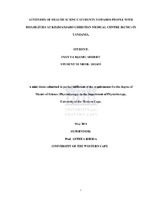| dc.description.abstract | The effects of disability on the individual not only include physical, psychological and
emotional adjustments but also negative attitudes of able bodied people towards persons with disabilities. The attitudes of healthcare professionals towards persons with disabilities could affect rehabilitation outcomes as well as the reintegration of these people into society. The aim of the study was to investigate the attitudes of health science students towards persons with disabilities at Kilimanjaro Christian Medical Centre (KCMC), in Tanzania. An explorative quantitative research design using a cross-sectional survey was used. The study sample (182) included all Physiotherapy, Occupational Therapy, Nursing, Medical and Optometry students. Data was collected using the Attitudes Towards Disabled Persons Scale,consisting of 20 items rated on a six-point Likert Type Scale. A demographic questionnaire
which included questions relating to the contact of the students with persons with disabilities was also administered. Descriptive and Inferential statistical analysis was conducted using the Statistical Package for the Social Sciences version 15.0. Permission to conduct the study was obtained from the Higher Degrees Committee and the Senate Research Grant and Study Leave Committee of the University of the Western Cape. Further permission was requested from Ministry of Education, Research and Ethics Department in Tanzania and the authorities of the respective Health Sciences programmes to include students in the study. Information obtained was handled with confidentiality and anonymity, and the students had the right to
withdraw from the study at anytime.The results revealed that the sample consisted of more females (58%) than males (41.2%).The majority of the participants were between the ages of 20-29 years. The highest response rate was from the medical students (29.1%) followed by the physiotherapy students (27.5%).The Optometry and physiotherapy students had more positive attitudes than the rest of the health science students who participated. The mean score on the ATDP scale was 59.01
(12.3) with scores ranging from 18 to 90. The results therefore revealed that overall the students had a neutral to negative attitude towards persons with disabilities. With regards to the contact of the students with persons with disabilities 26.9% of the participants responded that they had had a long talk with a person with a disability while only 17.6% of the students responded that persons with disabilities visited their homes. The mean contact score was 22.72 indicating that the students had a slightly above average contact with persons with disabilities. No association was found between the attitude and contact mean scores.Information obtained in this study could be used to influence the curriculum of Health Science Students at Kilimanjaro Christian Medical Centre. | en_US |

